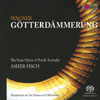Wagner Götterdämmerung
Bumpy moments, yes, but the Australian Ring closes on a trumphant note
View record and artist detailsRecord and Artist Details
Composer or Director: Richard Wagner
Genre:
Opera
Label: Melba Recordings
Magazine Review Date: 2/2008
Media Format: Super Audio CD
Media Runtime: 0
Mastering:
Stereo
DDD
Catalogue Number: MR301099/102

Tracks:
| Composition | Artist Credit |
|---|---|
| (Der) Ring des Nibelungen: Part 4, 'Götterdämmerung' |
Richard Wagner, Composer
Adelaide Symphony Orchestra Asher Fisch, Conductor Donna-Maree Dunlop, Wellgunde, Soprano Duccio Dal Monte, Hagen, Bass Elizabeth Campbell, Waltraute, Mezzo soprano Gaye MacFarlane, Second Norn, Mezzo soprano Joanna Cole, Gutrune, Soprano John Wegner, Alberich, Baritone Jonathan Summers, Gunther, Baritone Kate Ladner, Third Norn, Soprano Liane Keegan, First Norn, Contralto (Female alto) Lisa Gasteen, Brünnhilde, Soprano Natalie Jones, Woglinde, Soprano Richard Wagner, Composer South Australia State Opera Chorus Timothy Mussard, Siegfried, Tenor Zan McKendree-Wright, Flosshilde, Mezzo soprano |
Author: Arnold Whittall
If you’ve been collecting the Adelaide Ring, and finding more positive than negative aspects in the process, this final instalment shouldn’t disappoint. It builds to a commanding account of the closing scene, with Lisa Gasteen conveying immense depths of feeling as well as titanic conviction: and Asher Fisch shapes the orchestral epilogue in so fervently upbeat a manner that you could almost imagine the gods in Valhalla redeemed rather than destroyed. No wonder the audience cheers as soon as (and not before) the last chord dies away.
The problems found in previous instalments remain. The sound perspectives often seem artificial, raising questions about how the recording was actually engineered. Asher Fisch can be heavy-handed as he strives to sustain and even intensify the grandly epic character that dominates from the very first chord of the Act 1 Prologue. The recording makes the orchestral brass sound out sonorously, but there are oddities of balance, like the forward placing of the trumpet as it echoes Brünnhilde’s phrases in her Act 2 oath – not one of Wagner’s more subtle inspirations, and almost comically explicit here.
Gary Rideout, the Siegfried in the cycle’s third episode, is replaced here by another American, Timothy Mussard. He sounds pleasingly youthful and has stamina to spare, but his German can be awkward, and on several occasions he opts for rather coarse over-emphasis (perhaps encouraged by the production) when a less assertive lyricism would be better. As Hagen, Duccio dal Monte recorded the role to considerable effect (but within a very uneven performance overall) back in 2000 (1/02). In the context of the Adelaide cycle, I felt that the natural eloquence of his delivery would have made him an ideal Wotan. As Hagen he too resorts to bluster and even shouting at times, though fortunately not for his crucial final line. Elizabeth Campbell impresses as Waltraute, but Jonathan Summers’s Gunther is prone to excessive ranting and raving.
The profit and loss account could be extended, but I can discount a good number of incidental deficiencies when a performance of Götterdämmerung manages as inspiring an account of the Funeral Music and the closing scene as this one. Warts and all, the Adelaide Ring delivers an unusually powerful punch.
The problems found in previous instalments remain. The sound perspectives often seem artificial, raising questions about how the recording was actually engineered. Asher Fisch can be heavy-handed as he strives to sustain and even intensify the grandly epic character that dominates from the very first chord of the Act 1 Prologue. The recording makes the orchestral brass sound out sonorously, but there are oddities of balance, like the forward placing of the trumpet as it echoes Brünnhilde’s phrases in her Act 2 oath – not one of Wagner’s more subtle inspirations, and almost comically explicit here.
Gary Rideout, the Siegfried in the cycle’s third episode, is replaced here by another American, Timothy Mussard. He sounds pleasingly youthful and has stamina to spare, but his German can be awkward, and on several occasions he opts for rather coarse over-emphasis (perhaps encouraged by the production) when a less assertive lyricism would be better. As Hagen, Duccio dal Monte recorded the role to considerable effect (but within a very uneven performance overall) back in 2000 (1/02). In the context of the Adelaide cycle, I felt that the natural eloquence of his delivery would have made him an ideal Wotan. As Hagen he too resorts to bluster and even shouting at times, though fortunately not for his crucial final line. Elizabeth Campbell impresses as Waltraute, but Jonathan Summers’s Gunther is prone to excessive ranting and raving.
The profit and loss account could be extended, but I can discount a good number of incidental deficiencies when a performance of Götterdämmerung manages as inspiring an account of the Funeral Music and the closing scene as this one. Warts and all, the Adelaide Ring delivers an unusually powerful punch.
Discover the world's largest classical music catalogue with Presto Music.

Gramophone Digital Club
- Digital Edition
- Digital Archive
- Reviews Database
- Full website access
From £8.75 / month
Subscribe
Gramophone Full Club
- Print Edition
- Digital Edition
- Digital Archive
- Reviews Database
- Full website access
From £11.00 / month
Subscribe
If you are a library, university or other organisation that would be interested in an institutional subscription to Gramophone please click here for further information.




